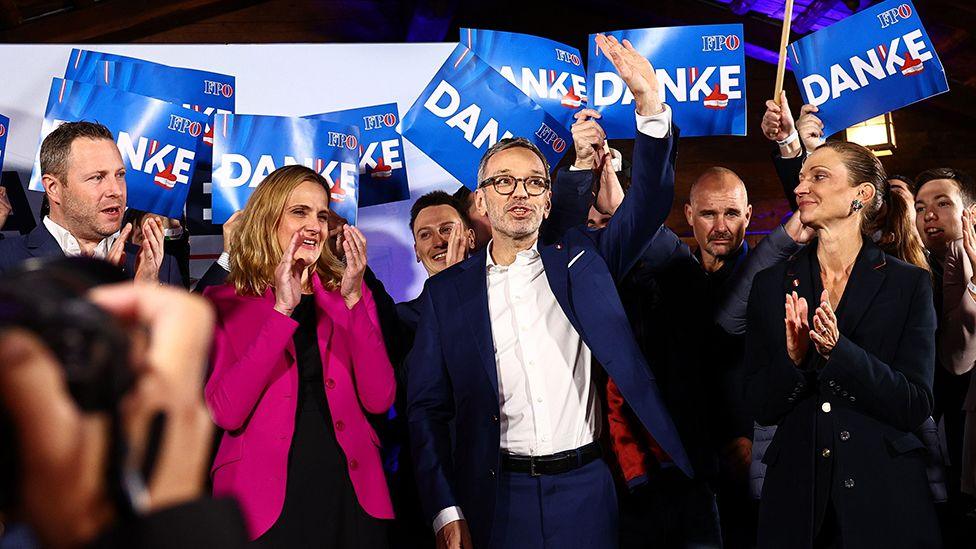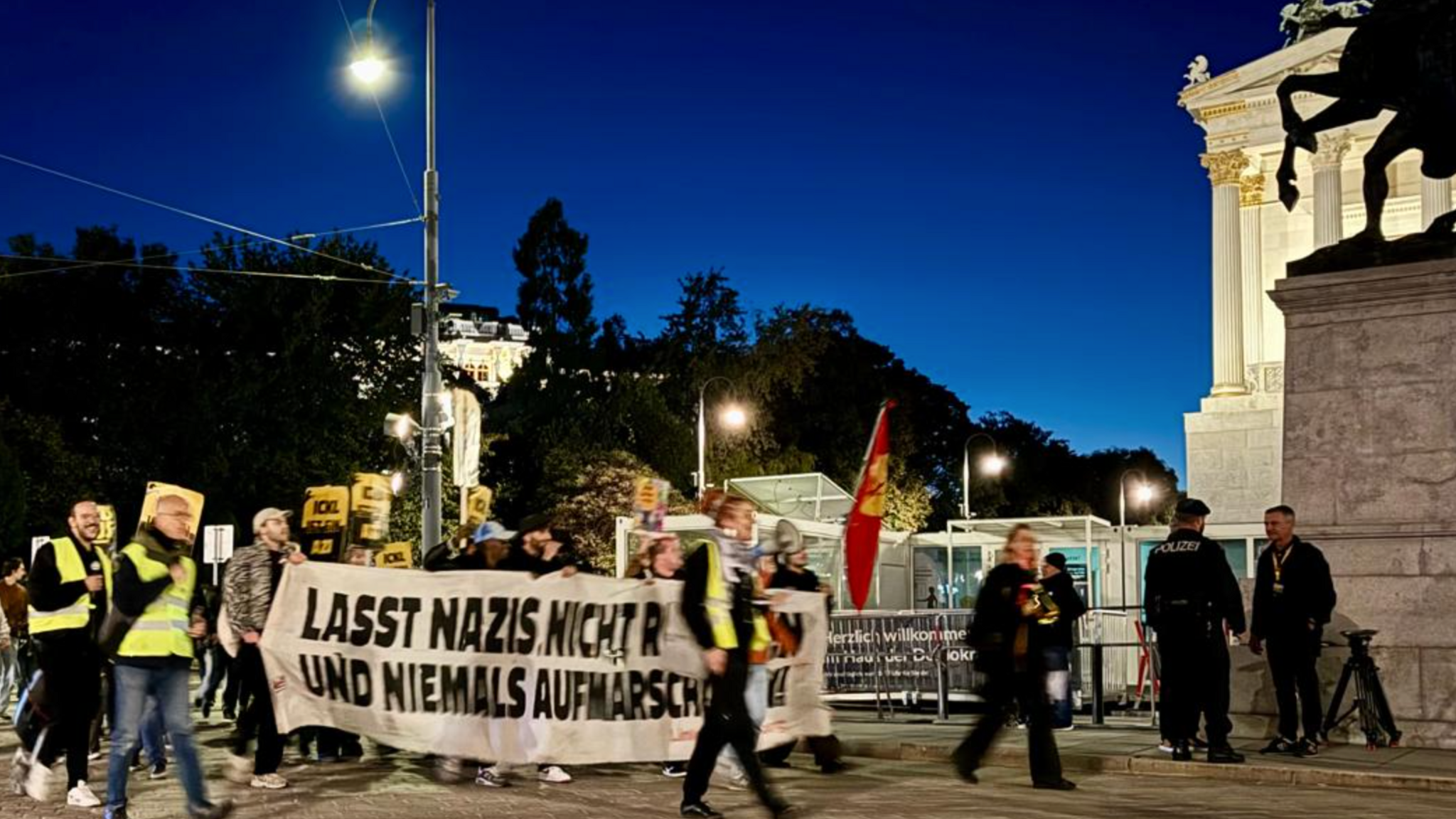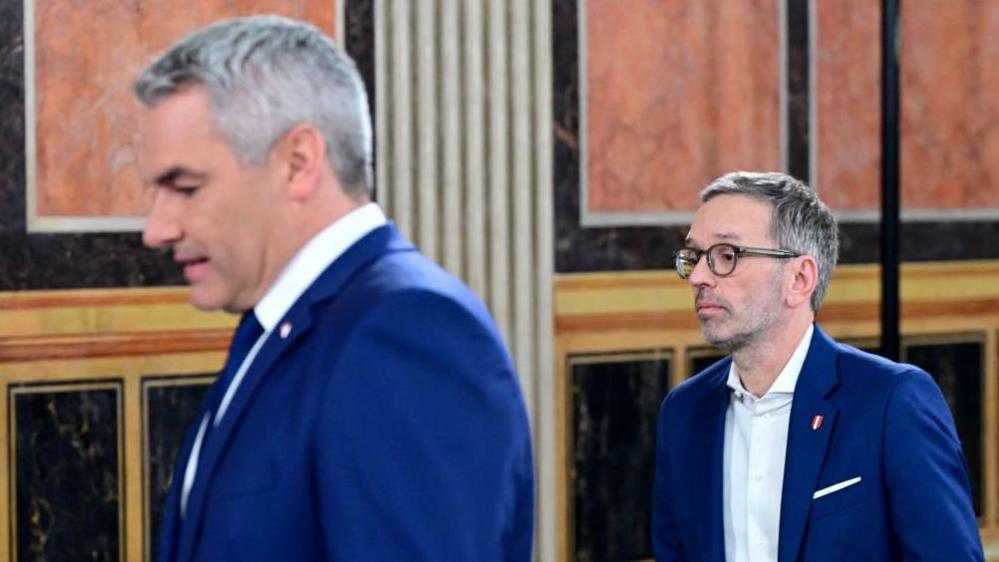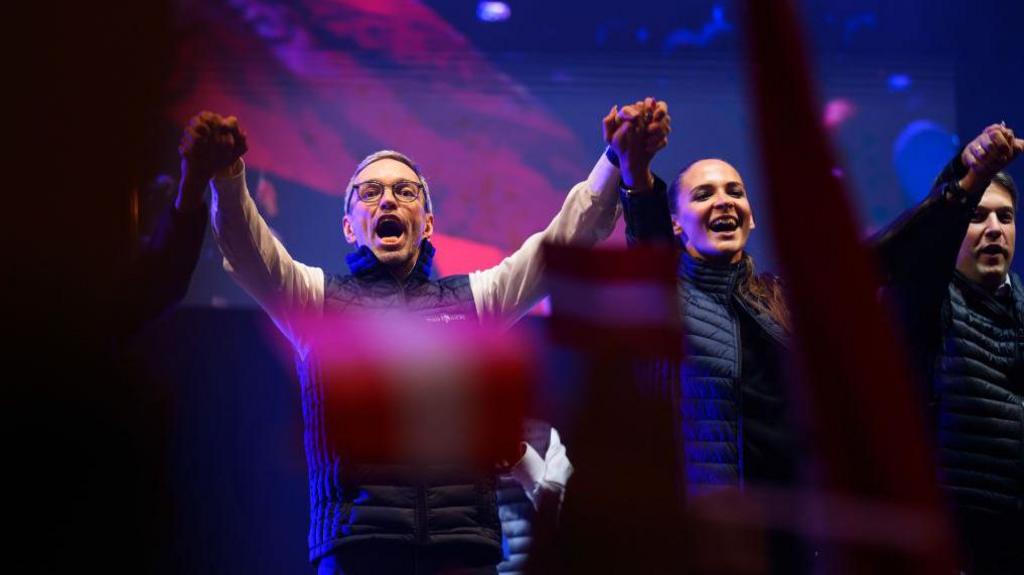Far right in Austria 'opens new era' with election victory

Victory does not mean Herbert Kickl's Freedom Party will automatically be able to form a government
- Published
Austria's far-right Freedom Party (FPÖ) has opened the door to a new era, its leader Herbert Kickl has told supporters, as they celebrated an unprecedented election victory.
Kickl's party won 28.9% of the vote according to official tallies - almost three points ahead of the conservative People's Party (ÖVP) on 26.3%, but far short of a majority.
Kickl's victory is only the latest in a string of far-right election successes in Europe and he praised voters for their "optimism, courage and trust" in delivering a "piece of history".
The FPÖ has been in coalition before, but the second-placed ÖVP has refused to take part in a government led by Kickl.
Kickl's main rival, incumbent Chancellor Karl Nehammer of the ÖVP, has said it was “impossible to form a government with someone who adores conspiracy theories”.
There was a high turnout of 77.3% as Austrian voters took part in an election dominated by the twin issues of migration and asylum, as well as a flagging economy and the war in Ukraine.
As half the map of Austria turned dark blue, FPÖ general secretary Michael Schnedlitz said "the men and women of Austria have made history today", although he refused to say what kind of coalition his party would try to build.
Postal votes were still being counted on Monday morning, but an analysis of voters suggested those aged 35-59 were most likely to back the far right, and marginally more women than men.
Kickl's party has won 57 seats in the 183-seat parliament, with the conservatives on 51 and the Social Democrats on 41, according to government projections.
Most of the votes have now been counted, but the final result will not be officially declared until Thursday.
The Freedom Party's fiery leader had promised Austrians to build "Fortress Austria", to restore their security, prosperity and peace.
The party wants firm rules on legal immigration and it has promoted the idea of remigration, which involves sending asylum seekers to their original countries. It also wants a bar on the right to asylum as a step towards citizenship.
Herbert Kickl has aligned himself closely with Hungarian Prime Minister Viktor Orban and his self-styled "illiberal democracy". On Sunday night, Social Democrat leader Andreas Babler warned that Austria must not follow the same path as Hungary.
Kickl had also spoken of becoming Volkskanzler (people's chancellor) which for some Austrians carries echoes of the term used to describe Adolf Hitler in Nazi Germany.
The FPÖ was founded by former Nazis in the 1950s. Two days before the vote some of its candidates were caught on video at a funeral where an SS song was sung. The party later denied the song, dating back to 1814, had any link to "National Socialist sentiments".
As the party's victory became clear, a small group of protesters appeared outside parliament carrying anti-Nazi banners. One read "Nazis, get out of parliament", while another said, "Don't let Nazis govern, and never [let them] march".

Protesters carrying anti-Nazi banners appeared outside parliament in Vienna
Forming a coalition is likely to prove complicated for Kickl, who is a divisive figure.
The Social Democrats, Greens and Neos have all ruled out a partnership with the far right.
The only possible coalition Kickl's party could form is with the conservatives, although the FPÖ would have to find a solution to the ÖVP's refusal to have Kickl as chancellor.
When Geert Wilders' Freedom Party won the Netherlands' election last November, he dropped his bid to become prime minister so that three other parties would agree to form a coalition. However, Kickl is keen to lead his country, promising Austrians to act as their "servant and protector".
Political analyst Thomas Hofer told the BBC it was by no means clear that Austrian President Alexander Van der Bellen, who oversees the formation of government, would give Kickl a “direct mandate to form a coalition”.
The ÖVP could in theory scrape together a coalition with the Social Democrats if the latest projections are correct, and could attract the liberal Neos party or the Greens.
Equally, Karl Nehammer may come under pressure from within the ÖVP to drop his objection. One leading FPÖ figure said after such a historic defeat he should resign, although that was rejected by the general secretary of Nehammer's party.

Current Chancellor Karl Nehammer (L) has made clear he will not serve in a Kickl-led coalition
President Van der Bellen has voiced reservations in the past about the FPÖ because of its criticism of the EU and its failure to condemn Russia's invasion of Ukraine. The party opposes EU sanctions on Moscow, citing Austria's neutrality, and many of its MPs walked out of a speech to the parliament in Vienna last year by Ukraine's Volodymyr Zelensky.
On Monday, Austrians had mixed feelings about the election results.
"I find it really sad that people get so close to radical right-wing ideas and ignore history," Nikolai Selikovsky, a resident of Vienna - which predominantly voted for the Social Democrats - told AFP.
"It also shows the failure of the other parties that they can't talk to each other constructively."
"I’m asking myself what we did wrong in the past 75 years," Karin Grobert, a commuter, told Reuters. She expressed concern that Austria will shift further to the right if coalition talks fail.
But Josef Binder, a 57-year-old carpenter who voted for FPÖ, said there was no reason other parties could not cooperate with Kickl.
"They also have to realise, the other parties, that if they negate 29% of voters, that that's actually not okay, it's undemocratic," he added.
Some worried about what the FPÖ's policy of remigration could mean for them.
Berat Oeztoprak, a 22-year-old kebab seller in Vienna, told Reuters: "What I might fear is that many will no longer be allowed to stay here."
He added: "I was born in Austria and I know that I belong here. I also did two years in the army and I have a badge. And I also served for the state for two years, I pay my taxes, I'm nice to the people here, they're just as nice to me."
Kickl's victory is the latest in almost a year of vote successes for radical right-wing parties in Europe.
Italy's Giorgia Meloni heads a right-wing coalition as leader of the far-right Brothers of Italy party and Germany's AfD topped the polls in the eastern state of Thuringia last month. France's National Rally won the vote in European elections last June.
Unlike Kickl, Italy's prime minister has given her full backing to the EU's defence of Ukraine in the face of Russia's full-scale invasion.
AfD co-leader Alice Weidel congratulated Kickl, posting a picture of the two together, and Marine le Pen of the National Rally said "this groundswell carrying the defence of national interests", external, after the votes elsewhere in Europe, confirmed the "people's triumphs everywhere".
Geert Wilders said times were changing, and that "identity, sovereignty, freedom and no more illegal immigration/asylum" was what millions of Europeans were longing for.
Kickl has tapped into fears about immigration in Austria and he has made the most of anger at the government's handling of the Covid pandemic, embracing conspiracy theories about obscure treatments for the virus.
For Kickl and his party, Sunday's election victory represents a significant recovery from 2019, when they came a distant third in the wake of a video sting scandal that engulfed their former leader.
- Published28 September 2024
